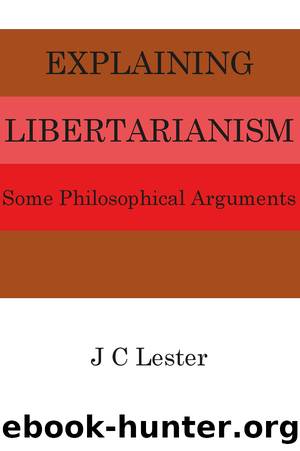Explaining Libertarianism: Some Philosophical Arguments by J. C. Lester

Author:J. C. Lester [Lester, J. C.]
Language: eng
Format: epub
Tags: Political Science, General
ISBN: 9781789559972
Google: qmOhDwAAQBAJ
Amazon: B00R1G2ONW
Goodreads: 24957675
Publisher: Legend Press Ltd
Published: 2014-11-30T09:08:14+00:00
The Main Answer to the Main Argument
Now we reach the main argument: âthe rich libertarian can identify, with reasonable determinacy, an excess. He thinks Nozick provides a reasonable way of identifying thisâ:
lacking much historical information, and assuming (1) that victims of injustice generally do worse than they otherwise would and (2) that those from the least well-off group in society have the highest probability of being the (descendants) of victims of the most serious injustice who are owed compensation by those who benefitted from the injustices (assumed to be those better off, though sometimes the perpetrators will be others in the worst-off group), then a rough rule of rectifying the injustices might seem to be the following: organize society so as to maximize the position of whatever group ends up least well-off in the society (Nozick 1974, 231). (78)
As already explained, we could dispute this argument on the basis that the alleged discrepancy due to past injustice is nugatory. Moreover, time and again we see propertyless, non-English-speaking, immigrants arrive and achieve above-average wealth within a generation or so â despite suffering from government taxation, regulation, schooling, welfare, and even conscription. So it seems unlikely that the past is what is significantly holding back the groups of least-well-off natives (i.e., those born there). And it is also relevant that, in the given quotation, Nozick appeared to be at a theoretical loss from a libertarian viewpoint and so simply reached for Rawlsâs maximin rule to patch up the problem. However, we do not need to press any of these points. For the correct response here is the same as it is to Rawls himself: if you want to âmaximize the position of whatever group ends up least well-off in the societyâ, then that is what libertarian private-property anarchy will do. The compound growth in prosperity that the free market brings will give the least-well-off group more than they could have under any other known system.
This argument might fail to convince socialists (unless they think about it seriously, at least). But that is not really the point. The point is that Macleod 2012 offers a philosophical argument where the key assumption is really an empirical presupposition that free markets keep the poor impoverished. And yet, ceteris paribus, the world appears to have less poverty wherever, and to the extent that, it has freer markets. Consider the essayâs conclusion, that âThe perhaps surprising implication of a libertarian principle of rectification of this sort is that material inequalities in our world are presumptively unjustâ (78). The correct libertarian reply is that not only is there no such implication, but, on the contrary, it is only to the extent that âmaterial inequalitiesâ on a libertarian basis in our world are tolerated that the conditions of the âleast well-off groupâ are maximally improved.
Even if this responseâs historical and pro-market interpretations are substantially mistaken, it is still an absurd overestimate to suggest that âa reasonable approximation of the rich libertarianâs excess, is the amount of resources he has above what he would have if resources were equally distributedâ.
Download
This site does not store any files on its server. We only index and link to content provided by other sites. Please contact the content providers to delete copyright contents if any and email us, we'll remove relevant links or contents immediately.
The Secret History by Donna Tartt(19088)
The Social Justice Warrior Handbook by Lisa De Pasquale(12190)
Thirteen Reasons Why by Jay Asher(8910)
This Is How You Lose Her by Junot Diaz(6887)
Weapons of Math Destruction by Cathy O'Neil(6280)
Zero to One by Peter Thiel(5802)
Beartown by Fredrik Backman(5754)
The Myth of the Strong Leader by Archie Brown(5507)
The Fire Next Time by James Baldwin(5446)
How Democracies Die by Steven Levitsky & Daniel Ziblatt(5219)
Promise Me, Dad by Joe Biden(5153)
Stone's Rules by Roger Stone(5088)
A Higher Loyalty: Truth, Lies, and Leadership by James Comey(4964)
100 Deadly Skills by Clint Emerson(4925)
Rise and Kill First by Ronen Bergman(4789)
Secrecy World by Jake Bernstein(4753)
The David Icke Guide to the Global Conspiracy (and how to end it) by David Icke(4720)
The Farm by Tom Rob Smith(4513)
The Doomsday Machine by Daniel Ellsberg(4490)
